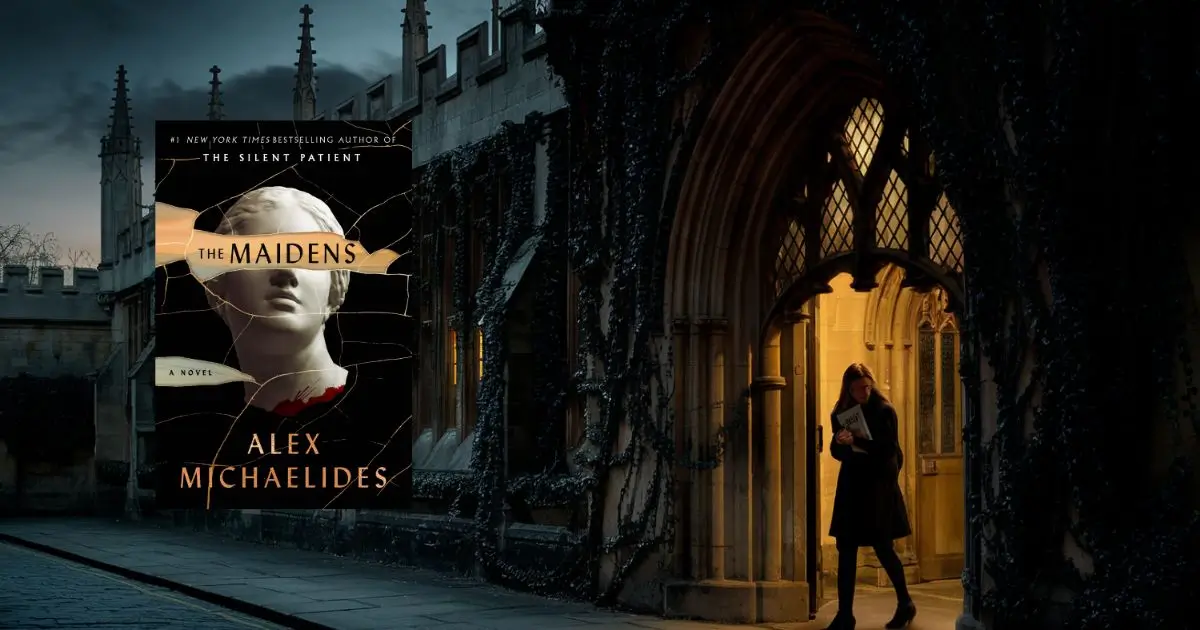When Alex Michaelides dropped The Silent Patient, it became an instant must-read—equal parts mind-bending and heart-pounding. Now, with The Maidens, he ups the ante, delivering a psychological thriller steeped in murder, Greek mythology, and the cloistered world of Cambridge academia.
At the heart of this dark, twisty tale is Mariana Andros, a grieving therapist turned amateur detective who unravels a sinister string of murders connected to a secret society. The story isn’t just about solving a crime—it’s about obsession, betrayal, and the unsettling truths we uncover about ourselves when everything else falls apart.
So, does The Maidens live up to the hype? Is it a worthy follow-up to The Silent Patient, or just a rehash of past glory? Let’s peel back the layers of this intricate thriller and see what lies beneath. Spoiler-free, of course.
Table of Contents
Summary of The Maidens

Dark academia, chilling murders, and Greek tragedy—The Maidens has it all. Alex Michaelides whisks readers into the ivy-covered cloisters of Cambridge University, a place steeped in beauty, history, and secrets. But beneath its picturesque facade lurks something far more sinister.
At the heart of the story is Mariana Andros, a group therapist still reeling from her husband’s recent death. Her life is a fragile puzzle, and when her niece, Zoe, calls her about a missing friend, Tara, Mariana is pulled into a world she thought she’d left behind—a world of academia, ancient mythology, and darkness that thrives in the shadows.
When Tara is found murdered—brutally, horrifyingly—Mariana is thrust into an investigation that quickly spirals out of control. The victim was a member of “The Maidens,” a secretive society of female students led by the charismatic and mysterious Professor Edward Fosca. A man adored by his students, feared by his peers, and, in Zoe’s eyes, the prime suspect. But Fosca has an alibi—one as unshakable as his charm.
Mariana isn’t convinced.
As she digs deeper, the line between her professional instincts and personal grief begins to blur. Mariana becomes fixated on Fosca, his obsession with Greek tragedies, and the eerie parallels between those ancient tales of sacrifice and the murders at Cambridge. Each discovery feels more unsettling than the last—cryptic postcards with Euripides’ quotes, rituals echoing ancient rites, and a growing body count.
And yet, it’s not just the crimes that keep you turning the pages—it’s Mariana. Her unraveling psyche, her grief, and her need to protect Zoe make her both a brilliant and flawed investigator.
But here’s the thing about The Maidens: just when you think you’ve pieced it all together, Michaelides pulls the rug out from under you. The final twist? You won’t see it coming. It’s not just shocking—it reframes everything you thought you understood about the characters and the story itself.
This is not just a murder mystery; it’s a psychological puzzle where every thread feels deliberate, and every detail matters. The Maidens will leave you questioning not just the motives of its characters but also the nature of obsession, trust, and the stories we tell ourselves to survive.
Character Analysis of The Maidens
What makes The Maidens so gripping isn’t just the plot twists—it’s the characters. Each one adds a layer of complexity, pulling you deeper into the story’s web of suspicion, obsession, and betrayal. Let’s unpack the key players and what makes them tick (or unravel).
Mariana Andros
Mariana is the heart of The Maidens, and she’s as much a mystery to herself as the case she’s trying to solve. A group therapist still mourning the tragic death of her husband, Sebastian, she’s smart, analytical, and deeply flawed. Her grief clouds her judgment, her nostalgia keeps her trapped in the past, and her emotional reactions often lead to risky, questionable choices.
She’s perceptive—quick to read others—yet blind to her vulnerabilities. Her fixation on Professor Fosca as the killer is both a strength and a flaw, pushing the story forward but also highlighting her emotional unraveling. Some readers find her frustrating, especially when her actions stray into implausible territory (like sneaking into Fosca’s apartment alone at night). But Mariana’s relentless need for answers, fueled by her protective love for her niece Zoe, makes her a compelling, if imperfect, protagonist.
Zoe
Zoe starts as the grieving niece—fragile, devastated by the loss of her friend Tara, and desperate for justice. She’s also the catalyst for Mariana’s investigation. But Zoe’s not as straightforward as she seems. Beneath her sorrow lies something darker, something manipulative.
Her relationship with Mariana is layered. On the surface, there’s genuine affection and a shared history (Mariana raised her after her parents’ death). But as the story unfolds, Zoe’s true nature challenges readers’ initial impressions. Some might argue she’s underdeveloped, more a plot device than a fully fleshed-out character, but her eventual revelations pack a punch that reshapes the entire narrative.
You can also read: The Bride Ali Hazelwood’s Captivating Romance Novel
Professor Edward Fosca
Edward Fosca is everything you’d expect from a dark academia villain: enigmatic, brilliant, and dangerously charismatic. A professor of Greek Tragedy with an almost cult-like following among his students—especially the Maidens—he’s a walking contradiction.
Is he a magnetic mentor or a manipulative predator? A misunderstood scholar or a cold-blooded murderer? Mariana’s obsession with him drives much of the plot, but Fosca remains elusive. His knowledge of ancient rituals and his eerie connection to the murders make him a central figure, even as the truth about his involvement defies expectations.
Supporting Cast
Michaelides peppers the story with a host of suspicious characters, each a potential red herring:
- Fred: The overly eager Ph.D. student with a knack for unsettling premonitions. Too innocent, or just innocent enough to make you question him?
- Morrison: The omnipresent groundskeeper who knows more than he lets on. Helpful or sinister? You’ll have to decide.
- Henry: Mariana’s obsessive patient, whose stalking behavior puts him squarely in the “potential killer” column.
- The Maidens: More than just victims, these young women are enigmas. Their idolization of Fosca and cryptic behaviors suggest they’re hiding more than meets the eye.
Even Sebastian, Mariana’s deceased husband, plays a pivotal role. Through flashbacks, he seems like the perfect partner, but as the layers peel back, a darker truth about him emerges.
Why the Characters Matter
What makes these characters unforgettable isn’t just their arcs—it’s how they interact. Mariana’s grief and vulnerability color her relationships, creating tension and mistrust. Zoe’s transformation flips the story on its head. Fosca’s sharp intellect and magnetic charm leave you questioning everything right up to the final reveal.
The Maidens isn’t just about solving a murder—it’s about unearthing the secrets we bury, the lies we tell ourselves, and the unexpected ways our past shapes our present.
And when does the final twist land? You’ll realize these characters were never what they seemed.
Themes and Motifs

The Maidens is rich with themes and motifs that resonate throughout the narrative.
- Grief: Mariana’s grief over the loss of her husband drives much of her actions throughout the story. Her emotional struggles influence her interactions with other characters and contribute to her obsession with solving the murders. The novel examines how grief can shape one’s perceptions and decisions, often clouding judgment and fostering irrational behavior.
- Obsession: Mariana’s obsessive nature is a central theme. Her fixation on Professor Fosca and his involvement in the murders leads her to take dangerous risks. Obsession is also seen in the way some of the other characters become fixated on Fosca, particularly the members of The Maidens.
- Greek Mythology: Greek mythology is a key element of The Maidens, with references to the ancient gods and goddesses woven throughout the plot. The myth of the maidens, in particular, mirrors the dynamics within the novel, with the young women worshiping Fosca and acting under his influence. This connection highlights the darker aspects of human nature and the powerful influence of authority figures.
- Dark Side of Academia: The novel also delves into the darker side of academia, exploring themes of power, manipulation, and the cult-like following of revered figures. The prestigious setting of Cambridge serves as the perfect backdrop for this sinister exploration of influence and control.
Despite these strengths, The Maidens is not without its flaws. Some readers have criticized the book for plot holes and an arguably simplistic portrayal of certain female characters, especially within the context of their relationships with Fosca.
The Ending of The Maidens
Spoiler Warning: Read on only if you’ve finished the book.
The ending of The Maidens doesn’t just tie the plot together—it flips it on its head. After a labyrinth of cryptic clues, chilling murders, and red herrings, the identity of the killer is revealed. And it’s not who you think. The twist isn’t just surprising—it’s the kind that makes you want to re-read the entire book, searching for the breadcrumbs Michaelides expertly scattered throughout the story.
The killer? Someone Mariana trusted. The motive? A dark cocktail of personal vendettas and deeply rooted psychological trauma. It’s the kind of revelation that forces you to reconsider everything—every interaction, every suspicion, every piece of dialogue that seemed innocent at first glance.
Michaelides excels at misdirection. The clues are there—hidden in plain sight—but they’re subtle enough that most readers won’t connect the dots until the final pages. The ending doesn’t just shock; it reframes the entire narrative, shedding light on Mariana’s past, her grief, and the fragile connections that bind the characters together.
Of course, not everyone will buy into the plausibility of the twist. Some readers might find it too extreme or outlandish. But love it or not, you can’t deny its impact. The finale forces you to confront the novel’s deeper themes: the destructive power of obsession, the fine line between justice and revenge, and the haunting ways our past can shape our future.
What makes the ending so effective is that it doesn’t feel like a gimmick. It’s not just about shock value—it serves a purpose, adding layers of meaning to the story and leaving readers with more questions than answers. The Maidens isn’t just a thriller; it’s a psychological exploration of trust, betrayal, and the unsettling truths we hide from ourselves. And the ending? It’s the perfect mirror for the book’s dark, complex heart.
My Take on The Maidens
In my opinion, The Maidens is a gripping and atmospheric read that kept me hooked from start to finish. The way Michaelides blends psychological tension, mystery, and Greek mythology is masterful, creating a dark and immersive setting that feels both haunting and intriguing. I loved how the suspense builds gradually, with each twist adding to the sense of unease. That said, I did notice some plot inconsistencies and felt that certain characters—especially in their relationships with Fosca—could have been explored more deeply. While these issues didn’t ruin the experience for me, they did leave a few threads feeling unresolved.
Overall, though, the novel delivers on its promise of unexpected twists and a thought-provoking story, making it a solid recommendation for anyone who loves psychological thrillers with a mythological twist.
I review more books and novels, which you can explore in the books section.

